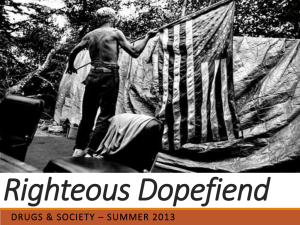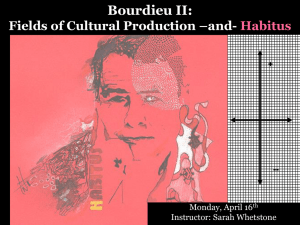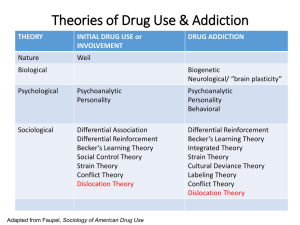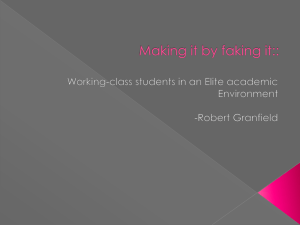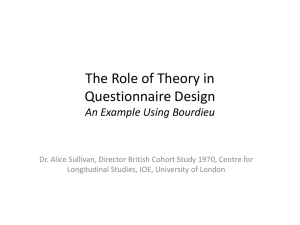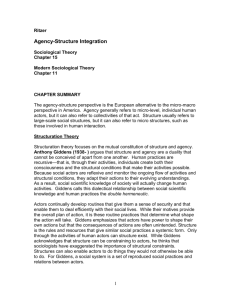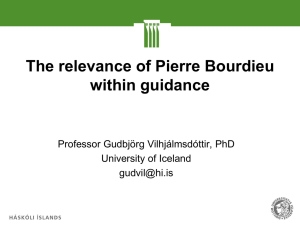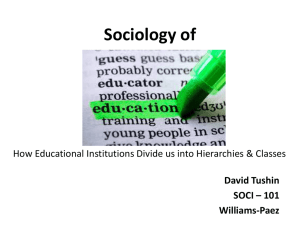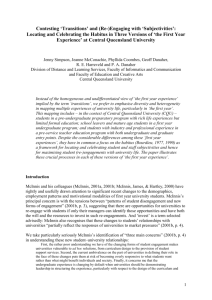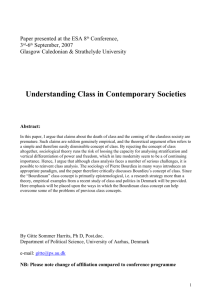“Fish out of Water”: Students from Disadvantaged Schools and the
advertisement
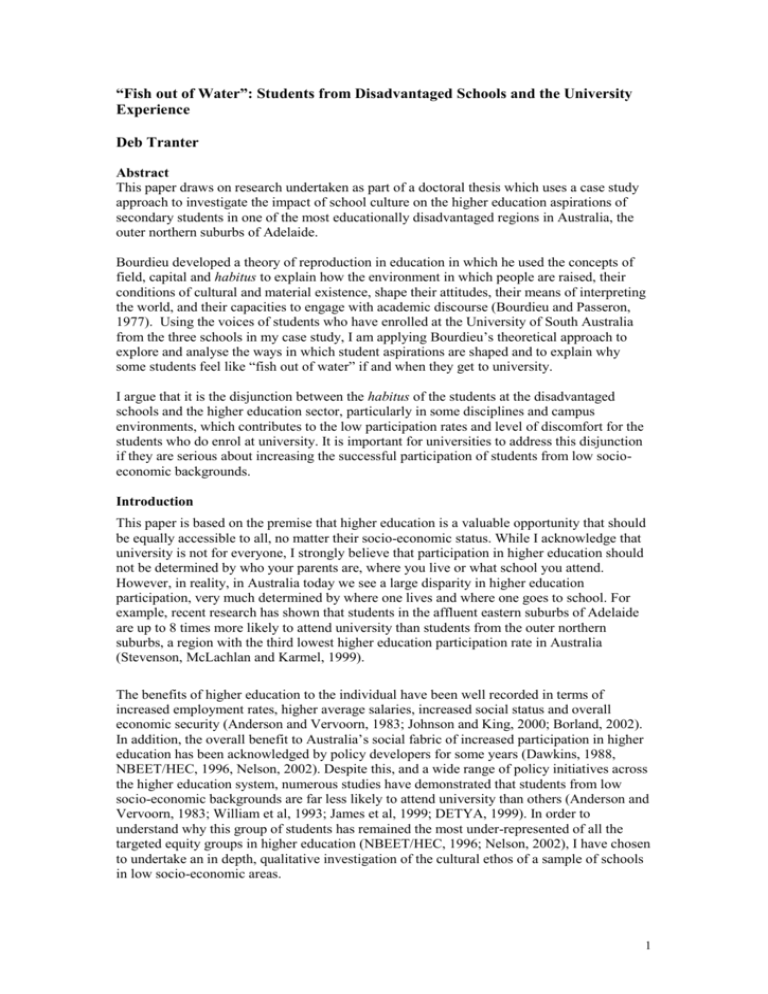
“Fish out of Water”: Students from Disadvantaged Schools and the University Experience Deb Tranter Abstract This paper draws on research undertaken as part of a doctoral thesis which uses a case study approach to investigate the impact of school culture on the higher education aspirations of secondary students in one of the most educationally disadvantaged regions in Australia, the outer northern suburbs of Adelaide. Bourdieu developed a theory of reproduction in education in which he used the concepts of field, capital and habitus to explain how the environment in which people are raised, their conditions of cultural and material existence, shape their attitudes, their means of interpreting the world, and their capacities to engage with academic discourse (Bourdieu and Passeron, 1977). Using the voices of students who have enrolled at the University of South Australia from the three schools in my case study, I am applying Bourdieu’s theoretical approach to explore and analyse the ways in which student aspirations are shaped and to explain why some students feel like “fish out of water” if and when they get to university. I argue that it is the disjunction between the habitus of the students at the disadvantaged schools and the higher education sector, particularly in some disciplines and campus environments, which contributes to the low participation rates and level of discomfort for the students who do enrol at university. It is important for universities to address this disjunction if they are serious about increasing the successful participation of students from low socioeconomic backgrounds. Introduction This paper is based on the premise that higher education is a valuable opportunity that should be equally accessible to all, no matter their socio-economic status. While I acknowledge that university is not for everyone, I strongly believe that participation in higher education should not be determined by who your parents are, where you live or what school you attend. However, in reality, in Australia today we see a large disparity in higher education participation, very much determined by where one lives and where one goes to school. For example, recent research has shown that students in the affluent eastern suburbs of Adelaide are up to 8 times more likely to attend university than students from the outer northern suburbs, a region with the third lowest higher education participation rate in Australia (Stevenson, McLachlan and Karmel, 1999). The benefits of higher education to the individual have been well recorded in terms of increased employment rates, higher average salaries, increased social status and overall economic security (Anderson and Vervoorn, 1983; Johnson and King, 2000; Borland, 2002). In addition, the overall benefit to Australia’s social fabric of increased participation in higher education has been acknowledged by policy developers for some years (Dawkins, 1988, NBEET/HEC, 1996, Nelson, 2002). Despite this, and a wide range of policy initiatives across the higher education system, numerous studies have demonstrated that students from low socio-economic backgrounds are far less likely to attend university than others (Anderson and Vervoorn, 1983; William et al, 1993; James et al, 1999; DETYA, 1999). In order to understand why this group of students has remained the most under-represented of all the targeted equity groups in higher education (NBEET/HEC, 1996; Nelson, 2002), I have chosen to undertake an in depth, qualitative investigation of the cultural ethos of a sample of schools in low socio-economic areas. 1 When I am not studying I am employed by the University of South Australia with some responsibility for attempting to increase access to the University for students who have experienced educational disadvantage. In 1995 the University introduced a special entry scheme targeting designated “disadvantaged” secondary schools with low rates of transition to higher education. This scheme (USANET) aims to improve access to the University for students from low socio-economic and rural/isolated backgrounds through a three-pronged approach: by increasing familiarity with higher education, by the addition of bonus points to tertiary entrance scores, and by providing a program of support for those students who enter the University through the scheme. Using a case study approach (Stake, 1994, Yin, 1991), I am undertaking an in-depth study of the culture of three of the more disadvantaged metropolitan schools targeted by USANET, and the aspirations and attitudes towards higher education of groups of students from these schools. As part of this study I am looking for any influences the outreach and access components of the USANET scheme may have had on the culture of the schools and the perceptions and aspirations of the students. The case study approach allows concentrated inquiry into the targeted schools, their students and their staff, facilitating an advanced understanding of the culture of the schools (Stake 1994) and the importance of that culture on the perceptions, attitudes and aspirations of their students. My data is drawn from observations at the school, analyses of documents and statistics and a series of semi-structured interviews with staff and students at the schools (students in year 12 and in year 10). I have also conducted semi-structured interviews with a small number of students who have enrolled at the University of South Australia from the case study schools (four from each of the three schools). In these interviews I asked students to reflect back on their experiences at school and why they think it is unusual for students from their school to gain entry to university. They were also asked to reflect on their experiences as students at the University. The interviews with this group of students form the basis for this paper. It is clear from the interviews to date that schemes like USANET hardly touch the surface in influencing the attitudes and aspirations of secondary students in the more disadvantaged schools. Such schemes appear to give hope to those students who are already interested in university, and to increase their expectations of success, but for the vast majority of students at these schools, university is an alien and inaccessible concept. “I don't know about other schools, but, the first time that I heard anything about Uni, when I was in year twelve, like, we hadn't had, like, information … in year twelve we went for like an excursion, like to, not this Uni, but to like Adelaide Uni, and that's the first time I had ever, ever, been to a Uni before in my life, I didn't ever know they were here.” (Male second year student) Attending university is not part of the ethos of the schools and their student populations, not part of what Pierre Bourdieu refers to as the habitus of the students, the pre-conscious, shared set of acquired and embodied dispositions and understandings of the world developed through objective structures and personal history (Bourdieu and Passeron, 1977; Harker, Maher and Wilkes, 1990; Oakley and Pudsey, 1997). The schools have a pervading culture of academic non-achievement and the minimal attempts of the universities to counter this through a variety of special entry schemes appear to have had little influence on student aspirations. Students only seem to become aware of the schemes as part of the application process, near the end of year 12, and had very vague ideas about how they worked. “Because I think that the USANET schemes for them, if they are determined to go, it’s probably only helping them to get in. But if they don’t want to go I don’t think that the scheme is going to make a difference to how they think.” 2 (Male second year student) “… we were classed an underprivileged school. I think everybody knew that. But I don’t think we all realised that we could get extra points for it though”. (Female fourth year student) Interestingly, students expressed a range of attitudes about the addition of bonus points; some were understanding and appreciative of the practice while others, rejecting the concept of “charity”, were uncomfortable with the thought that they might be “cheating” their way into university. There appears to be a considerable amount of discussion amongst new university students about their tertiary entrance (TER) scores and a number of my informants had been quite embarrassed by the comparisons: “I felt like I cheated my way in, not…not cheated but, like, benefits, you know what I mean, like, cause I only got a TER of sixty and the course was sixty eight to start with, and just felt that people, like, … I just thought they were feeling sorry for me so they'd, like, make it easier for me, so, and like… (Female first year student) “…in a way I felt quite intimidated by some of the other students…because I found out they had really high TERs. So I was just thinking that maybe I’m not cut out…like maybe I wasn’t supposed to be here.” (Male second year student) This latter quote in particular expresses the sense of self-doubt and uncertainty which recurs throughout the conversations I had with these students; the sense that perhaps they don’t really belong at university, a sub-conscious recognition that their system of understanding, their taken-for-granted way of being in the world, their habitus is somehow different and, being different in this way, they are misfits in the University environment. For these people their ‘illegitimacy’ as students, their sense that they didn’t really belong at University, was sustained by the idea that they had got there by the subterfuge of bonus points. On the other hand a number of students were pragmatic enough to acknowledge that without the bonus points they might not have been able to gain access to university and that being “smart” wasn’t necessarily enough. And for me, if I didn’t get the extra points I wouldn’t be at uni now. Even just a couple of extra points. Some of the people I know, they probably wouldn’t have got it. They were just under or something. And having that extra points. And they are really smart so they had an opportunity to go further because of it. (Female fourth year student) As a number of previous researchers have discussed (Connell et al, 1982, Anderson and Vervoorn, 1983, Ramsay et al, 1998, Clarke, Zimmer and Main, 1999, James et al, 1999), there is a huge complexity of reasons why students from low socio-economic backgrounds are less likely to enter university. These range from family and community expectations, financial hardship, attitudes to education, short-term rather than long-term goals, limited aspirations and role models/mentors, low self-esteem, poor literacy skills and study skills, inadequate academic preparation, the distraction of a critical mass of disengaged students in the classroom and an unstable, often inexperienced and uncommitted teaching staff. I do not contest the legitimacy of these explanations and indeed my informants tended to reinforce their effects. However my focus in this paper is on how University is experienced by students from low socio-economic backgrounds in order to increase understanding of the ways in which these effects arise. 3 The schools I am studying are all located in communities where very few people have attended university, where the habitus of the community is not shaped by this experience. In most cases teachers are amongst the only people that the school students are likely to meet who have any experience of higher education, hence the role of teachers in encouraging, or discouraging, students is crucial. These schools are all defined by the Education Department as “hard to staff” schools. They are avoided by many teachers and have to rely on a much higher proportion of recent graduates and contract staff than is usual (Thompson, 2002). Department policies severely limit the opportunities for schools to appoint teachers who choose to and are committed to work there and when the opportunity for a “school choice” position does become available, it is not uncommon for there to be only one applicant, or none at all. Instead the schools, and the students, have to manage with a constant stream of reluctant transferees and contract staff, many of whom are ill-equipped to cope. Not surprisingly, there is a high level of staff turnover. The year 12 Chemistry class at one school had five teachers last year, and the last one didn’t come back at the beginning of term four! A year 10 English class I was visiting had four different “full-time” and a constant stream of relief teachers. Of course, there are a number of accomplished, dedicated teachers at each school I have visited, some of whom have specialised in teaching students from low socioeconomic backgrounds. I believe that these committed and highly skilled teachers, with sufficient support structures behind them, are the key to lifting opportunities for the students at the so-called “disadvantaged” schools, a position well supported in the research (Connell, 1982, Smyth et al, 2000, Thompson, 2002). Certainly all the students I interviewed at the University talked about the importance of particular teachers in encouraging and supporting them. “My Chemistry teacher who I had for Maths as well, she was just fantastic…. I mean, if you needed any extra help, she’d stay there with you until seven o’clock at night, to make sure you got your work done and she’d be there for you at lunch and recess and before school and gave us all her phone number. (Female third year student) “There were some teachers that were so helpful. In my year 12 I had this one teacher. I wasn’t very good with my English because they didn’t teach me to write an essay. They didn’t teach me how to make my writing flow. And she taught me how. She gave me many opportunities to re-do my assignments. I did my assignments six times in my English class so I could pass”. (Female fourth year student) “…and he was heaps of help with, like, our essays, because we didn’t do a lot of essays at school, and when it came to doing all the essays for year 12 it was, oh, I don’t know how to write an essay, so, and he’d go through it and go, ‘oh you need to do this and you need to make sure these sentences make sense’ and, and you’d give him a draft every week and he’d go through it again and yeah, he was really good…” (Male second year student) The struggle with academic writing discussed in two of the quotations above is continued in the experiences students have at university. “And that’s what I’ve been struggling through uni with, with writing my assignments. I love the prac teaching and doing all the work with that, but struggling with the writing aspect. It makes it hard….” (Female fourth year student) Bourdieu’s theory of reproduction in education uses the concepts of field, capital and habitus in developing an explanation of how the environment in which students are raised, their conditions of cultural and material existence, shape their attitudes, their means of interpreting the world, and their capacities to engage with academic discourse (Bourdieu and Passeron, 1977). He states that “academic qualifications are to cultural capital what money is to economic capital” (p 187), thus degrees become the “prize” in the “game” (Bourdieu’s field) 4 of higher education. The academic staff at universities control the dispersal of that capital (the “prize”) as they see fit through the determination of “legitimate” knowledge and by ensuring the reproduction of that knowledge through the allocation of grades (Oakley and Pudsey, 1997.) Continuing the metaphor of the game, in the field (game) of higher education the understanding of how the game is played and how to win forms part of the habitus. The more practice or experience one has with the game, the stronger the habitus, the more successful one is likely to be. I am using Bourdieu’s theories to analyse what it is about the schools I am studying that means their students are so much less likely than students at middle class schools to complete year 12 and move on to university and how students from these schools then struggle to know “how to play the game” when they do manage to get there. A number of the students I interviewed talked about their sense of not fitting in, or belonging at the University. “Some of (the other students) were like, I’m so good, I can pay for it. They just seem to know what they are doing and seem to be higher than everybody else. And it was like some of them that you could tell that had the money and that’s why they can come to uni. Whereas you haven’t got the name brand clothes or anything like that. It’s like high school. Like coming back to high school again. Like for the first bit. I must be in the wrong tutorial groups…. … we had to introduce each other. And I got one that just totally ignored me. She just turned her back on me.… And she just totally ignored me. So I felt totally out of place then. ” (Female fourth year student) “…in the first year I was still like, I felt, like an outsider all the time, and you can spot like the groups of girls and guys that came from the same school, and that they have known each other, and it's just, oh, I don’t know anyone here, like, cause it was really only three people I knew, and one of my guy friends he, went to the levels, but he was doing a subject here so I got to see him for five minutes on a Monday or something, and it was like relief, I got to see someone I knew-… …the way they talk, and the things they talk about, is like, things that I don’t know, and things that I’ll probably never do, until, yeah, until I’m working…” (Female third year student) These quotations again illustrate the uncertainty the students feel about whether they really belong at university, whether they know how to ‘play the game’. There is a clear recognition of a hierarchy here, that some students ‘know the rules’, “they just seem to know what they are doing and seem to be higher than everybody else” while my informants feel “out of place”, “wrong”, “like an outsider all the time”. They understand that they haven’t really learnt how to play the game, their sense of displacement is consistent with Bourdieu’s conception of the way in which habitus works. “The way they talk and the things they talk about”, the cultural and linguistic capital of those who ‘belong’, are seen as being from a different world. One particularly articulate young man, from possibly the most disadvantaged secondary school in Adelaide, lost his eloquence as he struggled to explain his experiences to me: “Yeah, and I actually found it hard to, when I first started going, to, well … to actually talk to people, I felt like they were, I actually did feel like everyone was smarter than what I was, I just had that feeling, and so I never really spoke out, like, you know when you sit and you have a discussion, I kind of, just sat there, cause I used to think in my head, … to think that if I had said something I would go away and I would think, oh, I wonder if I sounded really stupid, like… 5 …and I, just, never wanted to be like, the leader of the group or speak or, cause I just, it was really weird, cause I'm not like that, and … sometimes people would say things and I was just like, oh, I have no idea what they mean… …but as well, it was a shock because … I came back and didn't know the, like processes of what people do, and I was like that, like, I could write essays but they weren't like what we were meant to write…. Like, I never once, even in year twelve, never had once referenced an essay. …and they, like, the mature age students were like me, they're just thinking referencing, what's that, whereas all the girls, because I had mostly girls in my social work, all the girls just you know, like, these beautiful essays with, you know, foot notes, and, I'm just like, oh, okay, what are references, and what, I hadn't even, I didn't know how to use the library. (Male second year student) In his own way, this young man is clearly articulating experiences that align with Bourdieu’s concepts of habitus and cultural capital; he didn’t know the “processes of what people do”, how to play the game. He felt that he didn’t belong, experienced a strong sense of failure and did in fact drop out of his first year at the university. Interestingly, the quotations from the three students above were from students studying at the University’s more middle class campus, located in Adelaide’s leafy green eastern suburbs. When this young man changed program, from social work to nursing at another campus, he immediately felt more comfortable, even though he had moved to a large inner-city campus, the same campus that housed some of the University’s most elite programs. Like I've come here this semester, like this semester, and I'm just normal, it's like I get along with everyone, but, at (leafy green campus) I was just a different person, I was so quiet and everyone used to call me the quiet one… …and yet at (leafy green campus) I was so, I don't know if I was ashamed or embarrassed to ask for help, and here I can just go to the library and say, like I, don't know how to do this, and I don't feel embarrassed, but there I didn't ask for help on anything, and that's probably why I was just like, lost, even when I couldn't find a building, instead of asking someone where to go I just didn't go… (Male second year student) The culture of the campus at which a student is studying, its mix of disciplines and the habitus of the students studying there appears to make a significant difference to the sense of belonging for a student. Evans and Peel (1999) in their review of the transition to university experience found that the transition experience varies according to the nature of the institution and the discipline area concerned. In my early interviews I had been surprised that the students had reported that they felt quite comfortable at university, after the first initial nerves most people experience in a major new situation; but then I interviewed the three students who enrolled at the leafy green campus described above! And this is the campus where most of the teacher education programs are taught, and social work. As Evans and Peel point out, the expectations and culture of particular disciplines, or fields, can vary enormously, as can the environment of an institution, or campus. The students I interviewed who were studying at the “Applied Sciences” campus, located in the northern suburbs of Adelaide and with a concentration of science and technology-based programs, were much more comfortable than those studying education and social work at the “Leafy Green” campus, as was the student studying Nursing at the city. The experiences of the students at the “Leafy Green” campus directly parallel those of the students at the University of Adelaide described by Copeland and Hayford (1997) in their study into the experiences of students from low socio-economic backgrounds at that “sandstone” institution. 6 You feel sometimes very isolated. I mean the only friends that I have…I don’t have any friends from the private schools because they basically want nothing to do with you. It’s mainly from public schools or people who are migrants from the same background as me”. (p 5) The public versus private school division is an additional factor which influences student access to and performance at university but is a significant topic in itself which I will not discuss here. However, even at the single campus, relatively homogenous University of Adelaide Copeland and Hayford also found a clear distinction between different disciplines, with low SES students enrolled in the more elite disciplines, such as law and medicine, finding it the most difficult to fit in and ‘play the game’. In my early analysis of the interviews with both students at the schools and those now enrolled at the University the most important factor in achieving a place at university, and persisting there, seems to be a very high level of inner motivation. I found that I had a goal I wanted to achieve. I think a lot, cause they don’t know what they want to do, that makes it really hard for them to continue. …I suppose I had the determination to continue. I want to teach. I don’t want to take the easy way out. I’m willing to take the challenges. (Female fourth year student) “Self motivation, I wanted to do well, and like, I seen people around me who, didn’t do well, and I think if you're going to be there, you may as well work and do the best you can, otherwise it's pointless going and, you can just go out and get a job, instead of being at school, so I figured, make the best of it and do well, because I knew others hadn’t done well, and I wanted to be better than them of course, cause I'm a competitive person, and I always compare myself to other people.” (Female first year student) “I always wanted to go to university, it was never an option to not go-…I just never had a thought of not doing it…” (Female fourth year student) One young woman organised herself to visit all three university open days, including one at least 40 kilometres away on the opposite side of town, and talked to the advisers available for the courses she was interested in, without any assistance from parents or the school. One young man persisted through two years of both year 11 and year 12` (at least once because of poor subject advice) and fathering two children to finally enrol in his chosen course. These students appeared to have a much higher level of motivation than most middle class students for whom family and school pressures support them through the uncertainties and distractions of adolescence to achieve the expected goals of a satisfactory year 12 score and higher education. For the vast majority of young adults struggling with these distractions without the expectations of family, school and peers, it is not surprising that so few do make it to university. It is only those with an extraordinary degree of motivation who persist, despite the wide range of discouraging factors in their personal and school lives, their “dislocated habitus” when at university (Oakley and Pudsey, 1997, p 7), and the stereotyping they all have to bear, to a greater or lesser extent, because they come from a community which is highly stigmatised. “Because a lot of people think northern suburbs school, they’re not going to go to university they’re just going to be on the dole or leave school at year 10, or whatever…these sort of stereotypes affect the people that live there, they start to believe that that is the way that they are and that’s all they can achieve. 7 …you always have the fear that people are going to say ‘oh which school did you go to?’ and you’re going to say ‘Oh XXX and they’re just going to look at you and say how the heck did you get here, what are you doing here?’ sort of thing….” (Female fourth year student) “…like when we introduced ourselves I said I was from XXX, and people were like laughing at us…yeah a few of my mates they always give me, like pay me out a bit, but I know it’s a pretty bad spot. Some people are bad and some people aint. You know, give them a chance, they’re not as bad down there.” (Male first year student) These students all travel long distances each day to attend university, further exacerbating their sense that they don’t really belong. All but one student was still living in the northern suburbs, even those who had moved from their family home, a number admitting that they feel more ‘at home’, more comfortable living in the community in which they grew up. Most expressed a commitment to working back in their communities when they graduate, while acknowledging that they now do not quite belong to their old world: “I see friends like, that I haven’t seen for ages and they go, ‘oh what do you do now?’ ‘Oh I go to uni.’ ‘Are ya?’ I go yeah, and like oh, and it’s sort of like, oh, well I’m not talking to you now. … I don’t know, I feel weird like, and they don’t understand … ‘what do you want to be a teacher for?’ ” (Female third year student) These students have reached the stage where their experience at university has moved them away from the habitus within which they grew up but they haven’t yet acquired the dispositions and cultural capital, the habitus, to make them feel ‘at home’ within the field of the university. Conclusion In my discussion of their experiences at university I have attempted to highlight the hurdles these students encounter in moving from a habitus of the working (or increasingly nonworking) class to the habitus of the university. Even a university such as the University of South Australia, which has made considerable efforts to increase access for people from low socio-economic backgrounds, is still a site of reproduction of the dominant classes, where the academics shape and control the cultural and linguistic capital which is part of the habitus of the middle classes but which is alien to my informants. In order to counter the “dislocated habitus” discussed by Oakley and Pudsey (1997, p7) and succeed at university the students appear to need an extraordinary degree of self-motivation, a level of motivation far above that held by most of their fellow class mates at school but also, I would suggest, above most of their middle class fellow students at university. For secondary students from low socio-economic backgrounds, special entry schemes like USANET have helped some of the most motivated gain access to university. Nevertheless, there is still a long way to go for such schemes to have any significant effect on the proportion of these students who are admitted to university. No matter how much effort the university sector places on broadening access, however, there can be little benefit unless the universities consider what happens when these students do leap the many hurdles and actually enrol. Recognition that students come from a wide diversity of backgrounds is increasingly important for all universities, especially in a multicultural Australia where the commitment to diversity is seen as fundamental to ongoing growth. Socio-economic status, or social class, should be considered in the same way as ethnicity, age or gender and universities must work towards as inclusive an environment as possible. This has implications for curriculum, teaching methodologies and support structures. It is important for universities and their staff to acknowledge and question the predispositions and ‘taken-for-granted’ expectations of the 8 university, to understand how university can be an alienating environment for many undergraduates, and to take steps to address this alienation. In the same way, universities need to acknowledge and value the lived experiences of the diversity of the student body through student-centred curriculum, teaching methodologies and support structures. In this way, students from all backgrounds are more likely to feel like fish swimming in, rather than out of, water. References Anderson, DS and Vervoorn, AE 1983, Access to Privilege: Patterns of Participation in Australian Post-Secondary Education, ANU Press, Canberra. Borland, J 2002, New Estimates of the Private Rate of Return to University Education in Australia, Melbourne Institute of Applied Economic and Social Research, The University of Melbourne, Melbourne, p 32. Bourdieu, P. and Passeron, J.C. 1977, Reproduction in Education, Society and Culture, London, Sage Clarke, J., Zimmer, B. and Main, R. 1999, ‘Review of the under-representation in Australian higher education by the socio-economically disadvantaged and the implications for university planning’, Journal of Institutional Research in Australasia, Vol. 8, No.1, pp 36-55 Connell, R.W., Ashenden, D.J., Kessler S., and Dowsett G.W. 1982, Making the Difference: Schools, Families and Social Division, Allen and Unwin Dawkins, J.S.1988, Higher Education: A Policy Statement, Canberra: AGPS. Department of Education, Training and Youth Affairs, Higher Education Division 1999, Equity in Higher Education, Canberra Dobson, I, Sharma, R and Ramsay, E, 1998 Designated Equity Groups in Australian Universities: Performance of 1996 Commencing Students in Undergraduate Award Courses, Australian Vice Chancellors’ Committee Copeland, J. and Hayford J. 1997 “Perceptions and Experiences of the University of Adelaide by Students from Low Socio-economic Backgrounds” (unpublished report) Evans, M. & Peel, M. 1999 “Factors and Problems in School to University Transition” in Transition from Secondary to Tertiary Performance Study Higher Education Series, DEST James R, Wyn J, Baldwin G, Hepworth G, McInnes C and Stephanson A, 1999 Rural and Isolated School Students and their Higher Education Choices, NBEET, AGPS, Canberra Johnson, P. and King, A. 2000, “Intergenerational Effects of Long term Unemployment: Scoping Study”, NATSEM report prepared for DETYA, Canberra Kemp D, 2001 Higher Education Report for the 2001 to 2003 triennium. DETYA, Canberra, pp 78-81 Harker, R., Mahar, C., and Wilkes, C., 1990, An Introduction to the Work of Pierre Bourdieu: The Practice of Theory, Macmillan 9 Mark, G., Fleming, N., Long, M. and McMillan, J. 2000, Patterns of Participation in Year 12 and Higher Education in Australia: Trends and Issues LSAY Research Report No. 17, ACER McInnes, C., James, R. and McNaught, C. 1995, First Year on Campus, Canberra: AGPS. NBEET/HEC 1996 Equality, Diversity and Excellence: Advancing the National Equity Framework, AGPS, Canberra Nelson B, (2002) Higher Education at the Crossroads: An Overview Paper, DEST, Canberra Oakley S, & Pudsey, J. 1997 “Symbolic Practices of Academe: the paradox of culture and knowledge” Access and Equity Special Projects Report, Flinders University of South Australia Pargetter, R. J., McInnis, C., James, R., Evans, M., Peel, M., Dobson, I.R. 1999, Transition from Secondary to Tertiary: A Performance Study, DETYA Higher Education Service, Report 36, Canberra Ramsay E, Tranter D, Charlton C & Sumner R, 1998 Higher Education Access and Equity for Low SES School Leavers, A Case Study. EIP, DETYA, Canberra Skuja E, 1997 ‘Performance of the Australian university sector in access and equity’ in Postle G.D, Clarke JR, Skuja E, Bull DD, Batorowicz, K and McCann, HA (eds) Towards Excellence in Diversity: Educational Equity in the Australian Higher Education Sector in 1995: Status, Trends and Future Directions, Toowoomba: University of Southern Queensland Press Smyth, J., Hattam, R., Cannon, J., Edwards, J., Wilson, N., Wurst, S. 2000, Listen to me I’m Leaving: Early School Leaving in South Australian Secondary Schools, Adelaide, Flinders Institute for the Study of Teaching Stake, R. E. 1994, ‘Case Studies’ in Strategies of Qualitative Inquiry edited by N Denzin and Y Lincoln Thousand Oaks: Sage, pp 86-109 Stevenson, S., Maclachlan, M, and Karmel, T. 1999, Regional Participation in Higher Education and the Distribution of Higher Education Resources across Regions, Occasional Paper Series, Higher Education Division, DETYA Tranter, D.R. 1998, ‘University Access for School Leavers from Low SES Backgrounds: A Case Study’ Paper presented at the Third National Conference on Equity and Access in Tertiary Education, Yepoon, September Thompson, P. 2002, Schooling the Rust Belt Kids: Making the Difference in Changing Times, Allen and Unwin Williams, T., Long, M., Carpenter, P. and Hayden, M. 1993, Entering Higher Education in the 1980s, Canberra: AGPS. Yin, R.K. 1991, Case Study Research: Design and Methods Newbury Park, Sage Publications 10

